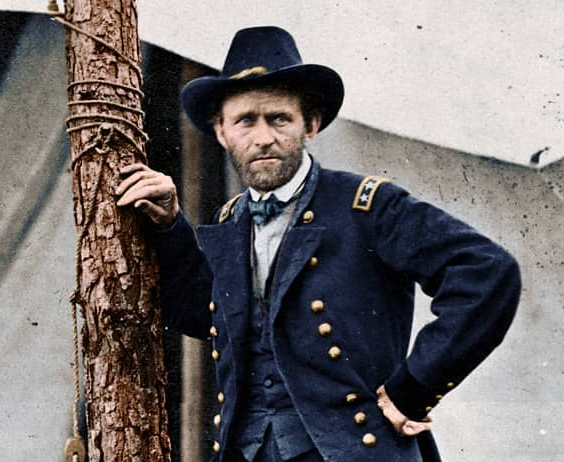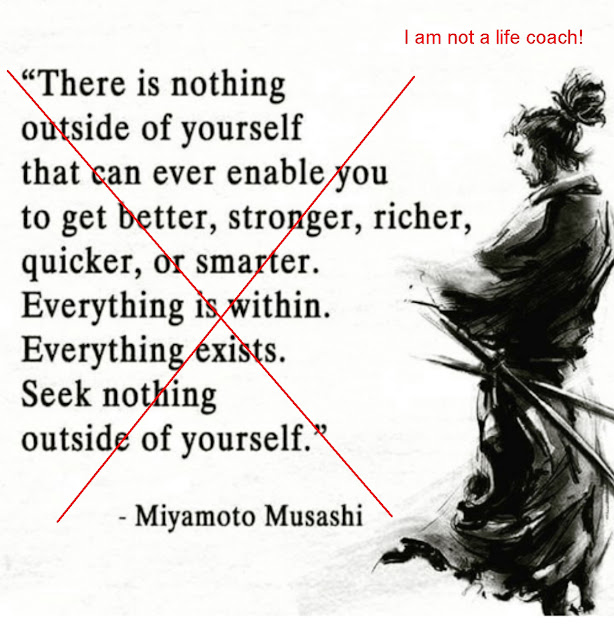Ulysses S. Grant, The Patient Fighter
 |
| US Grant at Cold Harbor, May 1864; Photo by Mathew Brady, colorized by @madsmadsen.ch from Battlefield Trust collection, https://www.instagram.com/p/BymcJKIBYvn/ |
Introduction
Today, 27 April 2020, is the 198th birthday of Ulysses S. Grant, born Hiram Ulysses Grant, 18th president of the United States and commanding general of Union forces in the US Civil War.To celebrate his birthday, I will take a look at one of the myths surrounding Grant, his so-called "wrestling career."
Grant is sometimes listed as one of the "Presidential wrestlers," alongside Abraham Lincoln, George Washington, and others. As we will see in this post, Grant there is no evidence that Grant was a wrestler, at least against other men, but there is evidence he was a family man and a patient fighter.
Grant as Wrestler, Online
If one visits the National Wrestling Hall of Fame web site, one finds the following:"Lincoln certainly did not achieve any national fame as a wrestler, but his career was typical of the way the sport was conducted in the first half of the 19th Century.
It was also typical of the wrestling careers of the seventh President, Andrew Jackson; the 12th, Zachary Taylor; the 18th, Ulysses S. Grant; and the 21st, Chester A. Arthur." (emphasis added)
The only citation is a 2008 book published by the NWHoF titled The Wrestling Presidents: From Pins to Patriots. The description says:
"Of those that had wrestled throughout America’s history, many have become our greatest leaders. Remarkably, thirteen of the United States Presidents – Washington, John Adams, Jackson, Taylor, Pierce, Lincoln, Garfield, Arthur, Theodore Roosevelt, Coolidge, and Eisenhower – have wrestled."
If you count the listed names, that's only eleven. Is Grant, not mentioned by name, one of the missing two?
The Origin of the Grant Wrestling Myth
 |
| Surrender at Appomattox by Tom Lovell, The Greenwich Workshop, http://www.greenwichworkshop.com/details/default.asp?p=1536&a=38&t=1&page=1&detailtype=artist |
I've read many Grant biographies, and I've never encountered anything that says Grant wrestled competitively, or against other men. Where could a myth about Grant being a wrestler originate? It seems to be the result of the following lines in a 1937 book by Marcus Griffin titled Fall Guys: The Barnums of Bounce.
At the end of chapter 2, Griffin writes:
"History tells us that General U.S. Grant particularly liked grappling. When General Robert E. Lee strode into Grant's tent at Appomattox to arrange terms for the Confederate surrender, it is recounted that Grant apologized for the untidy conditions of his headquarters.
'Pay no attention to things, Bob,' he said, 'me and some of the boys were having a wrestling match in here last night.'"
That story is a fabrication. US Grant did not, and would never have, addressed Lee as "Bob." Grant did not stay in any tent at Appomattox, and Lee met Grant in the parlor of Wilbur McLean's house to discuss terms.
Grant's True Wrestling
 |
| US Grant and Staff at City Point during the Siege of Petersburg, 1864, US Library of Congress, printed by Pittsburgh Post Gazette, https://www.post-gazette.com/opinion/Op-Ed/2019/09/08/Ulysses-S-Grant-Pittsburgh-commemorate-visit-Charles-McCollester-Next-Page/stories/201909080008 |
The only time wrestling is mentioned in reliable biographies of Grant doesn't involved other men: it involves playing with his children. In fact, one of those episodes is likely the inspiration for the myth told by Marcus Griffin.
In Ron Chernow's biography Grant, one can find the following on pages 570-571:
"Without [staff officer] Rawlins, Grant desperately needed Julia and the children, who visited City Point in August [1864], staying for a day aboard a steamer... [Horace] Porter, [staff officer], left a charming vignette of him roughhousing with his boys:
'The morning after their arrival, when I stepped into the general's tent, I found him in his shirtsleeves engaged in a rough-and-tumble wrestling match with the two older boys. He had become red in the face, and seemed near out of breath from the exertion.
[Grant was 42 at this point, his sons Frederick and Ulysses Jr., 14 and 12 respectively.]
The lads had just tripped him up, and he was on his knees on the floor grappling with the youngsters, and joining in their merry laughter, as if he were a boy again himself." (emphasis added)
The excerpt is from Porter's book Campaigning with Grant. There are other examples in other works as well, but this makes the point.
Grant was a family man who enjoyed wrestling with his sons for play and fun.
Grant the Patient Fighter: As Debt Collector
Although there is no evidence of Grant wrestling people his own age, two episodes recounted in the excellent book Captain Sam Grant by historian Lloyd Lewis paint Grant as what I call "the patient fighter."
These are specific incidents, separate from the many personal battles Grant must have encountered in his campaigns in Mexico and early in the Civil War.
First, Lewis recounts a story that happened while Grant was working as a debt collector for his fathers company, prior to joining the Union Army.
"The citizens of Prairie du Chien, a town on the Mississippi, knew Grant as a decisive man as well as an advisor on prospective wars. They saw him arrive one day to collect payment for a stock of goods which one of the firm's customers had fraudulently transferred to a third party.
Discovering that the merchandise was locked in a large stone building, Grant hired a lawyer, O.B. Thomas, secured a writ of replevin from the local court and summoned the sheriff.
That official being absent, his deputy, a burly and reputedly bold fellow known as Boss Brunson, accompanied them to the building where, behind a barred door, sat the pretended owner who, having heard that one of the Grants was in town, was waiting inside with a loaded shotgun.
On being told not to force the door on pain of being killed, Grant and Thomas urged the deputy to break it down. Boss quailed, whereupon Grant said 'If you're afraid to go in the building yourself, why don't you deputize someone to go in for you?'
'Very well,' blustered the fellow, 'I'll deputize you.'
Grant stepped back ten or twelve feet, then came with a rush, smashing his heel strategically near the lock, and, as the door flew open, pounced on the defender, wrested the gun away, ordered him to box the goods, and within a short time had his property on the steamboat, Galena bound." (emphasis added)
Lewis' footnote for the affair cites the Janesville Gazette (Wisconsin), quoted in the New York Tribune, August 7, 1885, p 5 as the source.
This story shows that Grant acted with determination when the time was right, and could handle himself in a dangerous physical encounter. He was 38 in 1860, when this incident took place.
Grant as Patient Fighter: As Colonel
 |
| US Grant, Brigadier General, The Photographic History of The Civil War in Ten Volumes: Volume One, The Opening Battles. The Review of Reviews Co., New York. 1911. p. 181, Wikipedia, https://en.wikipedia.org/wiki/Ulysses_S._Grant#/media/File:USGrant01.jpg |
In June 1861, Grant was appointed as colonel of the 21st Illinois regiment, and visited Camp Yates on June 16 or 17 to take command. He found a unit in shamles. Lewis' book recounts an incident that makes me call Grant "the patient fighter."
"[Aide de camp to Illinois Governor Richard Yates, John] Smith later described Grant's arrival:
'He was dressed very clumsily, in citizen's clothes... and when Grant walked in among them they began making fun of him...
A few of them, to show off to the others, got behind his back and commenced sparring at him and while one was doing this, another gave him such a push that made him hit Grant a terrible blow between the shoulders,' knocking off his hat.
Grant quietly stooped down, picked it up, dusted it, then placed it upon his head without saying a word.
He turned around and looked at the men, however, for an instant, and in that look the latter saw they had a soldier and a man of nerve to deal with.
Smith said the boys began to feel 'very much mortified' and one of them came up to explain 'it was all in fun, and hoped the new Colonel wouldn't get made about it.'
'But he did,' said Smith. 'Grant went to work immediately, and in a very short time had his men clothed and fixed up in good style.'"
Lewis cites a 1866 book by Captain George Whitfield Pepper, Personal Recollections of Sherman's Campaigns in Georgia and the Carolinas, pages 392-393.
This story shows that Grant didn't need to fight to regain his personal honor in this situation. If he had, he would have been a common brawler. Instead, he used the power of his office to apply discipline and get his men ready for combat.
Conclusion
 |
| Grant, History Channel series, https://www.history.com/shows/grant |
As you might have expected, Grant's story was more complicated than the popular narrative. I look forward to seeing how the History Channel portrays Grant in their upcoming three night event, Grant, beginning May 25.
If you like this article, check out our Facebook page, Instagram account, and Twitter feed. Be devoted!




Comments
Post a Comment